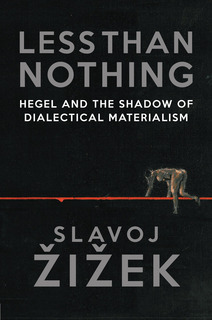International Journal of Žižek Studies
Artikelen
De ondergang van onze beschaving
Crisis als shocktherapie
Een schuinse kijk op de recente Žižek hetze
en het psychoanalyse-bashen in Vlaanderen
Žižek: waarheen, waarvoor?
Democratie en kapitalisme gaan scheiden
Ontferm je over kind Occupy
Hou vast aan het universele,
het biedt de mogelijkheid onszelf te overwinnen
Door de fantasie heengaan
De lacaniaanse stormloop van Slavoj Zizek
Zizek is geestig. Ik wil hem niet stoppen
Zizek over onmogelijke Liefde
The Pervert's Guide to Cinema
Slavoj Zizek als zondige Kunstkritiek
Alfred Hitchcock en Jacques Lacan
Schuins beziend. Jacques Lacan geïntroduceerd
vanuit de populaire cultuur
Het obscene geheim
Schelling en Zizek
Elvis van de Psychoanalyse
Boeken
Amazon
Versobooks
Teksten: Lacan.com
Eerst als tragedie, dan als klucht
Slavoj Žižek
Hegel stelde dat de geschiedenis zich steeds herhaalt. Marx beaamde dit, maar verbeterde hem op een essentieel punt. Historische gebeurtenissen vinden eerst plaats als tragedie, maar keren vervolgens terug als klucht. In Slavoj Žižeks kernachtige nieuwe boek is dit gegeven het uitgangspunt voor een messcherpe analyse van de situatie anno nu.
Eerst als tragedie, dan als klucht kijkt terug op de eerste tien jaar van de eenentwintigste eeuw. In 2001 begonnen deze met een tragedie: de aanslagen op 11 september.
Zeven jaar later eindigen ze met een klucht: de economische crisis. In die twee momenten stierf het liberalisme feitelijk twee keer: als politieke theorie en als economisch systeem.
Toch houdt het lijk van deze ideologie niet op ons op allerlei manieren te bespoken. Een bijzonder ernstige zaak, omdat het verhindert de kritieke staat van de wereld adequaat aan te pakken.
Volgens Žižek staat de apocalyps op de stoep, niet alleen in ecomomische zin, maar ook ecologisch, biogenetisch en sociaal. Het is de hoogste tijd dat progressievelingen en vemeend ‘links’ ophouden met navelstaren en serieus over de revolutie gaan nadenken!
Living in the End Times
Slavoj Žižek
There should no longer be any doubt: global capitalism is fast approaching its terminal crisis. Slavoj Žižek has identified the four horsemen of this coming apocalypse: the worldwide ecological crisis; imbalances within the economic system; the biogenetic revolution; and exploding social divisions and ruptures. But, he asks, if the end of capitalism seems to many like the end of the world, how is it possible for Western society to face up to the end times?
In a major new analysis of our global situation, Žižek argues that our collective responses to economic Armageddon correspond to the stages of grief: ideological denial, explosions of anger and attempts at bargaining, followed by depression and withdrawal.
Video
Less Than Nothing:
Hegel and the Shadow of
Dialectical Materialism
Slavoj Žižek
Slavoj Žižek's masterwork on the Hegelian legacy. For the last two centuries, Western philosophy has developed in the shadow of Hegel, whose influence each new thinker tries in vain to escape: whether in the name of the pre-rational Will, the social process of production, or the contingency of individual existence.
Hegel's absolute idealism has become the bogeyman of philosophy, obscuring the fact that he is the dominant philosopher of the epochal historical transition to modernity; a period with which our own time shares startling similarities.
Today, as global capitalism comes apart at the seams, we are entering a new transition. In Less Than Nothing, the pinnacle publication of a distinguished career, Slavoj Žižek argues that it is imperative that we not simply return to Hegel but that we repeat and exceed his triumphs, overcoming his limitations by being even more Hegelian than the master himself. Such an approach not only enables Žižek to diagnose our present condition, but also to engage in a critical dialogue with the key strands of contemporary thought-Heidegger, Badiou, speculative realism, quantum physics and cognitive sciences. Modernity will begin and end with Hegel.




